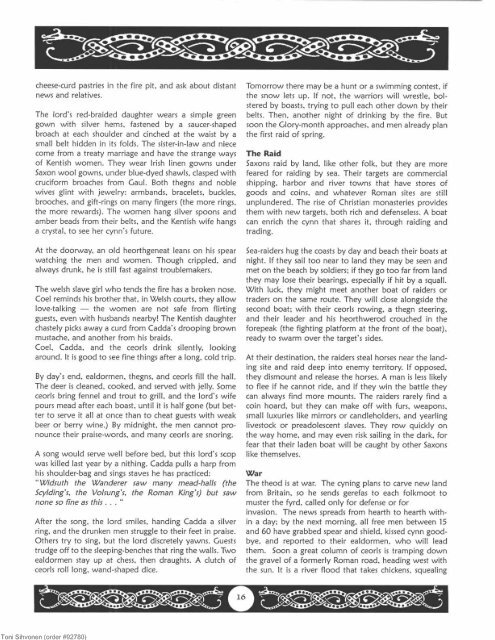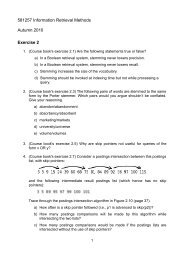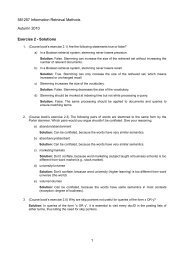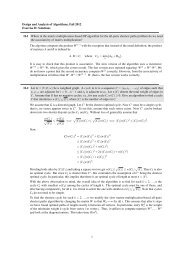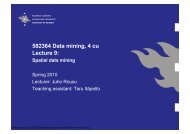Toni Sihvonen (order #92780) 62.142.248.1
Toni Sihvonen (order #92780) 62.142.248.1
Toni Sihvonen (order #92780) 62.142.248.1
Create successful ePaper yourself
Turn your PDF publications into a flip-book with our unique Google optimized e-Paper software.
<strong>Toni</strong> <strong>Sihvonen</strong> (<strong>order</strong> <strong>#92780</strong>) 6<br />
cheese-curd pastries in the fire pit, and ask about distant<br />
news and relatives.<br />
The ford’s red-braided daughter wears a simple green<br />
gown with silver hems, fastened by a saucer-shaped<br />
broach at each shoulder and cinched at the waist by a<br />
small belt hidden in its folds. The sister-in-law and niece<br />
come from a treaty marriage and have the strange ways<br />
of Kentish women. They wear Irish linen gowns under<br />
Saxon wool gowns, under blue-dyed shawls, clasped with<br />
cruciform broaches from Gaul. Both thegns and noble<br />
wives glint with jewelry: armbands, bracelets, buckles,<br />
brooches, and gift-rings on many fingers (the more rings,<br />
the more rewards). The women hang silver spoons and<br />
amber beads from their belts, and the Kentish wife hangs<br />
a crystal, to see her cynn’s future.<br />
At the doorway, an old heorthgeneat leans on his spear<br />
watching the men and women. Though crippled, and<br />
always drunk, he is still fast against troublemakers.<br />
The welsh slave girl who tends the fire has a broken nose.<br />
Coel reminds his brother that, in Welsh courts, they allow<br />
love-talking - the women are not safe from flirting<br />
guests, even with husbands nearby! The Kentish daughter<br />
chastely picks away a curd from Cadda’s drooping brown<br />
mustache, and another from his braids.<br />
Coel, Cadda, and the ceorls drink silently, looking<br />
around. It is good to see fine things after a long, cold trip.<br />
By day’s end, ealdormen, thegns, and ceorls fill the hall.<br />
The deer is cleaned, cooked, and served with jelly. Some<br />
ceorls bring fennel and trout to grill, and the lord’s wife<br />
pours mead after each boast, until it is half gone (but better<br />
to serve it all at once than to cheat guests with weak<br />
beer or berry wine.) By midnight, the men cannot pronounce<br />
their praise-words, and many ceorls are snoring.<br />
A song would serve well before bed, but this lord’s scop<br />
was killed last year by a nithing. Cadda pulls a harp from<br />
his shoulder-bag and sings staves he has practiced:<br />
“ Widsuth the Wanderer saw many mead-halls (the<br />
Scylding’s, the Volsung’s, the Roman King’s) but saw<br />
none so fine as this. . . “<br />
After the song, the lord smiles, handing Cadda a silver<br />
ring, and the drunken men struggle to their feet in praise.<br />
Others try to sing, but the lord discretely yawns. Guests<br />
trudge off to the sleeping-benches that ring the walls. Two<br />
ealdormen stay up at chess. then draughts. A clutch of<br />
ceorls roll long, wand-shaped dice.<br />
Tomorrow there may be a hunt or a swimming contest, if<br />
the snow lets up. If not, the warriors will wrestle, bolstered<br />
by boasts, trying to pull each other down by their<br />
belts. Then, another night of drinking by the fire. But<br />
soon the Glory-month approaches, and men already plan<br />
the first raid of spring.<br />
The Raid<br />
Saxons raid by land, like other folk, but they are more<br />
feared for raiding by sea. Their targets are commercial<br />
shipping, harbor and river towns that have stores of<br />
goods and coins, and whatever Roman sites are still<br />
unplundered. The rise of Christian monasteries provides<br />
them with new targets, both rich and defenseless. A boat<br />
can enrich the cynn that shares it, through raiding and<br />
trading.<br />
Sea-raiders hug the coasts by day and beach their boats at<br />
night. If they sail too near to land they may be seen and<br />
met on the beach by soldiers: if they go too far from land<br />
they may lose their bearings, especially if hit by a squall.<br />
With luck, they might meet another boat of raiders or<br />
traders on the same route. They will close alongside the<br />
second boat: with their ceorls rowing, a thegn steering,<br />
and their leader and his heorthwerod crouched in the<br />
forepeak (the fighting platform at the front of the boat),<br />
ready to swarm over the target’s sides.<br />
At their destination, the raiders steal horses near the landing<br />
site and raid deep into enemy territory. If opposed,<br />
they dismount and release the horses. A man is less likely<br />
to flee if he cannot ride, and if they win the battle they<br />
can always find more mounts. The raiders rarely find a<br />
coin hoard, but they can make off with furs, weapons,<br />
small luxuries like mirrors or candleholders, and yearling<br />
livestock or preadolescent slaves. They row quickly on<br />
the way home, and may even risk sailing in the dark, for<br />
fear that their laden boat will be caught by other Saxons<br />
I i ke themselves.<br />
War<br />
The theod is at war. The cyning plans to carve new land<br />
from Britain, so he sends gerefas to each folkmoot to<br />
muster the fyrd, called only for defense or for<br />
invasion. The news spreads from hearth to hearth within<br />
a day: by the next morning, all free men between 15<br />
and 60 have grabbed spear and shield, kissed cynn goodbye,<br />
and reported to their ealdormen, who will lead<br />
them. Soon a great column of ceorls is tramping down<br />
the gravel of a formerly Roman road, heading west with<br />
the sun. It is a river flood that takes chickens, squealing


